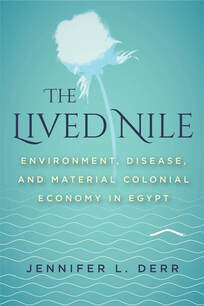Announcing the Winner of the 2020 PEP Book Prize
The Political Economy Project (PEP) is pleased to announce the results of the 2020 Middle East Political Economy Book Prize competition. With this prize, PEP aims to recognize and disseminate exceptional critical work on the political economy of the Middle East. This year marks the fourth annual award, and the selection committee reviewed nearly twenty nominations for a range of books dealing with political economy—representing a diversity of disciplines, topics, and geographic focus.
The 2020 selection committee recognizes the following author for their original contributions to critical political economy research:
The 2020 selection committee recognizes the following author for their original contributions to critical political economy research:

Winner
Jennifer L. Derr's The Lived Nile: Environment, Disease, and Material Colonial Economy in Egypt (Stanford University Press, 2019).
From the 2020 Selection Committee: The Lived Nile challenges us to think differently about economy, labor, and subjectivity. Tracing the story of the Nile as a living and lived site, Jennifer Derr respectfully builds on, while entirely departing from, conventional wisdoms on Egyptian history. Beginning in the late nineteenth century and moving carefully through to the interwar period, The Lived Nile is a remarkable book. Derr traces the building of the Khazan Aswan in 1902, showing how the making of a “new” Nile irrevocably changed the environment, the economy, the laboring body, the practices of expertise, and the power and limits of state authority. Derr invites all of us who study political economy to center the environment, in all its dynamism and materiality, as central to the accumulation and experiences of capital. Similarly, Derr’s invitation to understand labor as environmentally situated is a new way to do Middle East history. This book will become canonical both for its historical revelations and its methodological invitations.
Jennifer L. Derr's The Lived Nile: Environment, Disease, and Material Colonial Economy in Egypt (Stanford University Press, 2019).
From the 2020 Selection Committee: The Lived Nile challenges us to think differently about economy, labor, and subjectivity. Tracing the story of the Nile as a living and lived site, Jennifer Derr respectfully builds on, while entirely departing from, conventional wisdoms on Egyptian history. Beginning in the late nineteenth century and moving carefully through to the interwar period, The Lived Nile is a remarkable book. Derr traces the building of the Khazan Aswan in 1902, showing how the making of a “new” Nile irrevocably changed the environment, the economy, the laboring body, the practices of expertise, and the power and limits of state authority. Derr invites all of us who study political economy to center the environment, in all its dynamism and materiality, as central to the accumulation and experiences of capital. Similarly, Derr’s invitation to understand labor as environmentally situated is a new way to do Middle East history. This book will become canonical both for its historical revelations and its methodological invitations.


